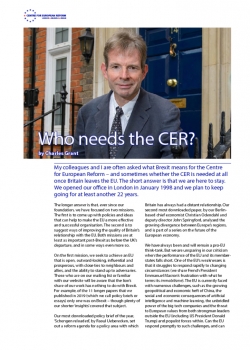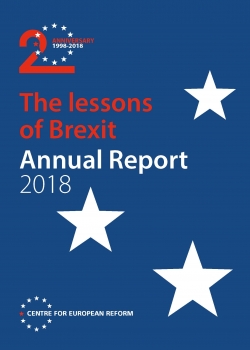
Who needs the CER?
My colleagues and I are often asked what Brexit means for the Centre for European Reform – and sometimes whether the CER is needed at all once Britain leaves the EU. The short answer is that we are here to stay. We opened our office in London in January 1998 and we plan to keep going for at least another 22 years.
The longer answer is that, ever since our foundation, we have focused on two missions. The first is to come up with policies and ideas that can help to make the EU a more effective and successful organisation. The second is to suggest ways of improving the quality of Britain’s relationship with the EU. Both missions are at least as important post-Brexit as before the UK’s departure, and in some ways even more so.
On the first mission, we seek to achieve an EU that is open, outward-looking, influential and prosperous, with close ties to neighbours and allies, and the ability to stand up to adversaries. Those who are on our mailing list or familiar with our website will be aware that the lion’s share of our work has nothing to do with Brexit. For example, of the 11 longer papers that we published in 2019 (which we call policy briefs or essays) only one was on Brexit – though plenty of our shorter ‘insights’ covered that subject.
The first mission of the CER is to come up with policies & ideas that can help make the EU a more effective & successful organisation. The second is to suggest ways of improving the quality of Britain’s relationship with the EU.
Our most downloaded policy brief of the year, ‘Schengen reloaded’, by Raoul Ueberecken, set out a reform agenda for a policy area with which Britain has always had a distant relationship. Our second most downloaded paper, by our Berlin-based chief economist Christian Odendahl and deputy director John Springford, analysed the growing divergence between Europe’s regions, and is part of a series on the future of the European economy.
We have always been and will remain a pro-EU think-tank. But we are unsparing in our criticism when the performance of the EU and its member-states falls short. One of the EU’s weaknesses is that it struggles to respond rapidly to changing circumstances (we share French President Emmanuel Macron’s frustration with what he terms its immobilisme). The EU is currently faced with numerous challenges, such as the growing geopolitical and economic heft of China, the social and economic consequences of artificial intelligence and machine learning, the unbridled power of the big tech companies and the threat to European values from both strongman leaders outside the EU (including US President Donald Trump) and populist forces within. Can the EU respond promptly to such challenges, and can it be proactive as opposed to simply reactive? The answers will determine whether Europe can preserve its values, prosperity and sovereignty.
Ever since the CER started, about half our researchers have been non-British and the team currently includes two Germans, an Italian, a Pole, a Spaniard and a Ukrainian. This year they will be working on subjects such as the EU’s relations with the US, Russia and China; the Middle East and the neighbourhood policy; European defence policy and NATO; police and judicial co-operation, and migration; the EU’s trade and industrial policies; and the European economy and eurozone reform.
One thing that has changed since the Brexit referendum is that we have opened offices in Brussels and Berlin. We did so to reinforce our links to continental policy-makers: we are a European think-tank with a headquarters in London rather than a UK-centric organisation. Both these offices help to insert the CER into the EU’s policy debates, promote our ideas
and gather useful information – and they also host events.
As to Britain’s future ties to the EU, the Centre for European Reform favours the closest possible relationship that is compatible with the political realities – for the mutual benefit of the UK and the 27.
As for the second mission, concerning Britain’s ties to the EU, we favour the closest possible relationship that is compatible with the political realities – for the mutual benefit of the UK and the 27. We regret Brexit and also the meagre prospects of the UK remaining close to the EU’s customs union and single market. But the CER deals with the world as it is rather than as we would wish it to be. We shall suggest constructive and viable ways for the EU and the UK to work well together.
And we shall continue to speak truth to power on both sides of the negotiation, as we have done since the referendum. On the EU side, we think some of its leaders have been too complacent since the British voted to leave their club. We will argue against those who take a maximalist line on excluding third countries from close co-operation with the EU, whether on trade, security, foreign or defence policy. Only criminals, terrorists and hostile states will benefit if UK-EU co-operation in such areas becomes unnecessarily difficult.
As for the British, we shall explain the trade-offs that are fundamental, for example that if the UK insists on more regulatory autonomy, there will be more disruption to current patterns of trade. Many influential people in Britain still appear to be unaware of the trade-offs, partly because of wishful thinking and partly because large parts of the media lack the expertise and/or desire to hold politicians to account.
Negotiators may find it easier to achieve a mutually beneficial post-Brexit partnership in the security sphere than for trade. We hope to see security co-operation that in practical terms will be almost as close as it has been during the UK’s membership. Both the UK and the EU will be stronger and safer if bespoke ways can be found to plug the British into EU structures. The political constraints in the UK are unlikely to be overwhelming: few people voted for Brexit because they disliked the Common Foreign and Security Policy. Both Macron and German Chancellor Angela Merkel are keen to see a close security relationship, to diminish the chances that a loose-cannon Britain will slide towards the US.
However, there can only be a close partnership in the realm of justice and home affairs if the UK accepts EU rules on data, and a role for the European Court of Justice. Furthermore, there is a serious risk that an acrimonious breakdown of the trade talks could stymie efforts to build a deep partnership on security.
Britain and the EU will be negotiating on the countless dossiers of their relationship for the next decade and perhaps much longer. The CER’s role will be to help explain to each side of the Channel what is motivating the other side, and what policies and actions are most likely to ensue. Our vantage point is ideal: our head office is in London, yet our contacts in Brussels, Berlin, Paris and other capitals, in Europe and beyond, are second to none.
Britain and the EU will be negotiating on the countless dossiers of their relationship for at least the next decade. The CER's role will be to explain to each side what motivates the other, and what the consequences may be.
Any think-tank that aspires to influence must produce proposals that are practicable, well-argued and readable. And that is what we have sought to do over the past two decades, putting a premium on sober, serious, rigorous analysis of the key political and economic challenges facing Europe. The CER’s highly-experienced team puts a lot of time into ensuring that our publications are well-written and that our seminars are high-level and interesting. We plan to stick to that formula, although the means by which we reach our audience is constantly evolving and some people now know us mainly via social media or podcasts. We will also remain on hand to share our expertise and opinions with policy-makers, parliamentarians, the media and the wider public, without fear or favour.
Charles Grant is director of the Centre for European Reform.



